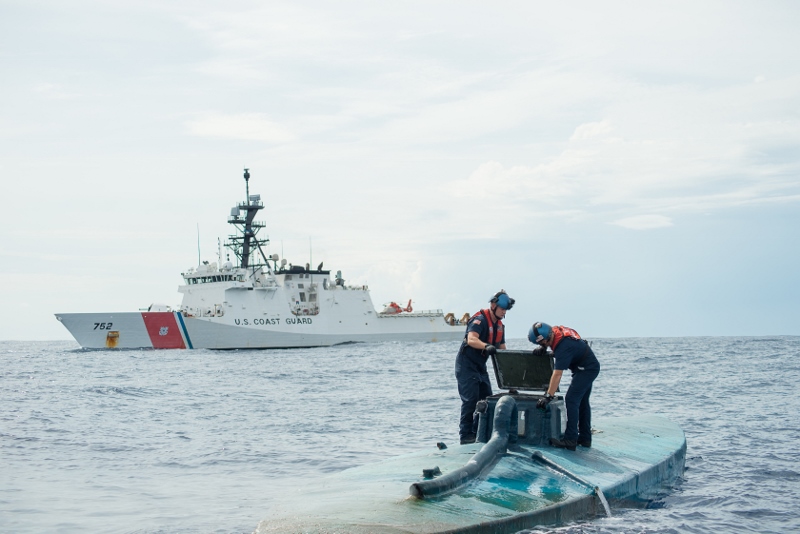As a maritime force the Coast Guard punches above its weight — a necessity from being starved in comparison to the other military services.
Reports that the White House Office of Management and Budget is seeking a 14% reduction in the Coast Guard budget is ringing alarm bells on both sides of the aisle in Congress, where there has been bipartisan support for the service, most recently for $1 billion to start building a 21st-century icebreaker force.
In its quest for more money for the military and border controls, the Trump administration could be setting itself up for a broader fight over cuts to programs that benefit coastal districts — including Gulf Coast and upper Midwest states that helped tilt the election. Other OMB recommendations seek deep cuts in the National Oceanic and Atmospheric Administration, including the satellite program that provides hurricane tracking data, and eliminating the $73 million Sea Grant program and its array of grants to coastal and Great Lakes states.
For years advocates for the Coast Guard argued with successive administrations that more was needed. That message broke through after the 2001 terror attacks, as the Coast Guard’s port and maritime security role got turned up to 11 on the dial.
Recapitalization of the cutter fleet made progress, with the new 154’ Sentinel-class Fast Response Cutters, and the 418’ National Security Cutters. Both have made notable contributions to the Coast Guard’s intensive cat-and-mouse drug smuggling patrols, integrated with other federal law enforcement and regional allies to detect and intercept cocaine-laden boats and semisubmersibles.
Coast Guard leaders acknowledge they only catch some fraction of what gets into the U.S. mainland. But it’s a lot more than anyone else finds. Rep. Duncan Hunter, R-Calif., chairman of the House Subcommittee on Coast Guard and Merchant Marine — and a Trump supporter — told the President in a March 2 letter how the Coast Guard seizes more cocaine at sea than what is intercepted at all ports of entry and by other domestic law enforcement.
As OMB issued its early budget guidance – the administration’s opening gambit for negotiating with Congress — skeptics both Democratic and Republican saw inconsistencies with Trump’s stated policy priorities.
“We cannot defend our homeland and continue critical security missions without the U.S. Coast Guard. It is as simple as that,” said Rep. Frank LoBiondo, R-N.J., a subcommittee member whose district includes the Cape May Training Center and Air Station Atlantic City.
“From traditional search and rescue to maritime security and drug interdiction, there is no other dedicated or capable force as the U.S. Coast Guard. Whomever is advising President Trump that the Service could do more with even less is detached from the facts and reality on the ground,” LoBiondo said.
OMB is looking to shave $500 million from the Coast Guard construction program, and that appears to target the ninth National Security Cutter yet to be built by Huntington Ingalls Shipbuilding, Pascagoula, Miss.
Sen. Thad Cochran, R-Miss., got $640 million inserted into a 2015 spending bill for the additional ship. Fiscal hawks are always on the lookout for defense pork spending, like more transport aircraft the Air Force does not really want. But in this case, Hunter too has said the Coast Guard could use five or six more National Security Cutters.
Hence, another Hunter challenge in his letter to Trump: “The termination of this contract is especially disconcerting when considered alongside the operational successes these assets have demonstrated, not to mention the hundreds of high paying American jobs that would be lost.”

Lt. Cmdr. Joe Rizzo, commander of the cutter cutter Lawrence Lawson, speaks to members of the House Appropriations Committee during breakfast aboard the Lawson in Washington, D.C., Thursday, Mar. 9, 2017. USCG photo.
The Coast Guard on Thursday had some face time with Congressional budget decision makers, when members of the House Appropriations Committee visited the new Fast Response Cutter Lawrence Lawson, tied up in Washington, D.C. before its formal March 18 commissioning at Cape May, N.J. Accompanied by assistant commandant Adm. Charles D. Michel, the members were briefed on the new cutter and its class, now replacing the Island-class patrol boats.
Other proposed cuts would have big impacts on waterways, like a reported 97% reduction in the Environmental Protection Agency cleanup efforts for the Great Lakes. On the Department of Commerce side, OMB is looking for a 26% reduction in budget for NOAA’s National Environmental Satellite, Data and Information Service (NESDIS).
Climate change skeptics in Congress are hostile to NESDIS for its role in research suggesting that climate changes are accelerating in response to warming. But the satellite network is also critical to maritime interests for providing ocean data and storm tracking updates.
News that the Sea Grant program is targeted rattled the seafood industry, where the federal funding functions like the Department of Agriculture’s extension programs that help farmers. Supporters are rallying to present how those federal dollars pay off with economic benefits from helping shellfish growers, seafood processing and other industry sectors.
Defenders of Sea Grant and related coastal programs are gearing up their pushback, organizing state universities and other academic and industry partners to tout the program’s economic benefits. Supporters recalled a similar defunding attempting in 1981, the first term of the Reagan administration, that ran into a wall of opposition among members of Congress from coastal states.




